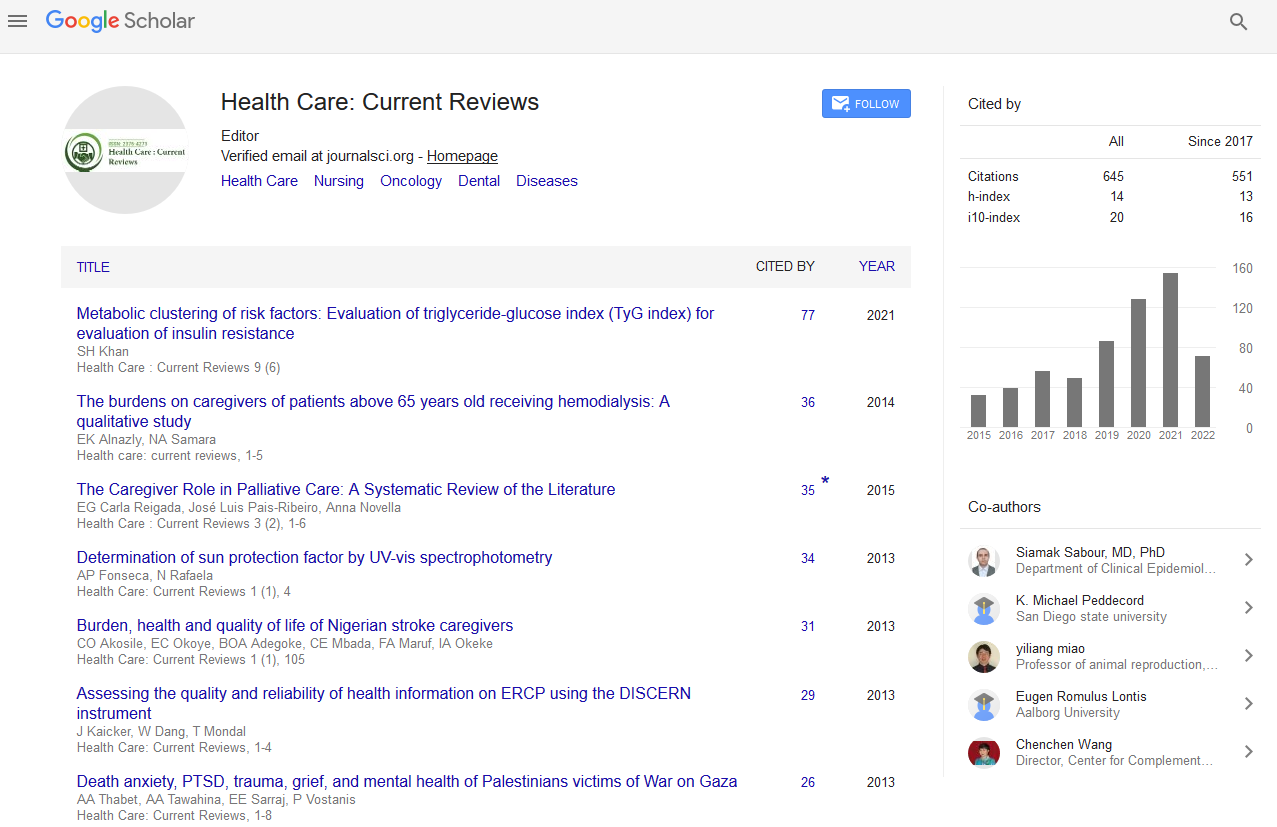PMC/PubMed Indexed Articles
Indexed In
- Open J Gate
- Academic Keys
- RefSeek
- Hamdard University
- EBSCO A-Z
- Publons
- Geneva Foundation for Medical Education and Research
- Google Scholar
Useful Links
Share This Page
Journal Flyer

Open Access Journals
- Agri and Aquaculture
- Biochemistry
- Bioinformatics & Systems Biology
- Business & Management
- Chemistry
- Clinical Sciences
- Engineering
- Food & Nutrition
- General Science
- Genetics & Molecular Biology
- Immunology & Microbiology
- Medical Sciences
- Neuroscience & Psychology
- Nursing & Health Care
- Pharmaceutical Sciences
Genetic susceptibility and functional genomics screen reveals a novel observation of low fever mediated induction of TNF-ñ correlates up-regulated expression of proinflammatory cytokines during infection and pathology
3rd Indo-Global Summit & Expo on Healthcare
October 05-07, 2015 New Delhi, India
Mohammad Sohail, Asha Kaul, Prerna Bali, Shadab Anwar, Om Prakash Singh, Ajay Kumar Sharma, Mohammad Raziuddin and Tridibes Adak
Vinoba Bhave University, India National Institute of Malaria Research, India
Scientific Tracks Abstracts: Health Care: Current Reviews
Abstract:
Background & Methods: Clinical implications of proinflammatory cytokines and its functional analysis during malarial severity are poorly elucidated and substantially unknown. Thus, in view of its clinical relevance and disease association prompted us to address the paradoxical role of TNF-α; triggers rapid pyrogenic response by regulating inflammatory cytokine mediated pathogenesis, employing ELISA, PCR-RFLP, semi-quantitative RT-PCR, qRT-PCR and immunoblotting. Observations: The genotypic distribution of TNF-α promoter position 308G/A in P. falciparum was observed significant (p=0.012) whereas P. vivax was not significant but strongly associated (OR=3.8). Genetic polymorphism significantly influences serum TNF-α level in both vivax and falciparum infection. Interestingly, we observed mutation specific TNF-α expression and found significantly elevated mRNA level in all the three genotypes (GG, GA and AA) of vivax as compared to falciparum patients. Further all other serum cytokines (IL-1β, IL-6, IL-8, IFN-γ and IL-2) level are significantly (p=0.0001) up-regulated except IL-12; whereas IL-10 was significantly (p=0.0001) depleted as compared to healthy subjects. Most surprisingly we observed significantly higher serum TNF-α level (130.2 pg/ml) in patients with lower or no fever compared to higher fever (112.7 pg/ ml). Thus, to elucidate the hypothesis of regulatory role of fever specific induction of TNF-α, we investigated and interestingly observed significantly up-regulated expression of TNF-α in vivax infection as compared to marginally up-regulated in falciparum patients with low fever at the level of mRNA and protein. Similarly significant alterations in inflammatory cytokines (IL-1β, IL-8 and IFN-γ) genes represented most prominent fold induction in vivax as compared to falciparum whereas IL-10 was significantly depleted expression in vivax compared to falciparum at the level of mRNA. Conclusions: Thus, association of genetic polymorphism, expression of proinflammatory cytokines and mutation specific induction of TNF-α-augments pathology and up regulates transcriptional changes. Further novel observations demonstrate a critical role of low fever that regulates the TNF-α induction in association with other inflammatory cytokines; suggesting a multipathway mechanism for the induction of TNF-α associated fever. Taken together, our findings provide evidence that activation and induction of inflammatory cascade is an indispensable regulatory event in TNF-α mediated clinical symptoms and pathological progression, highlighting biological significance in host defense mechanisms by enhancing cell-mediated immunity and stimulating the protective immunological cascade in human malaria.
Biography :
Mohammad Sohail, PhD is a recipient of the following: Young Scientist-DST, Govt. of India ISID-USA, Small Grant Award-Fall 2012, Young International Investigator Award- CAS, Govt. of China Dr. D S Kothari Post-Doctoral Awardee-UGC, Govt. of India University Department of Zoology Faculty of Science Vinoba Bhave University Hazaribag-825301, Jharkhand, India.
Email: soh.khan@hotmail.com


